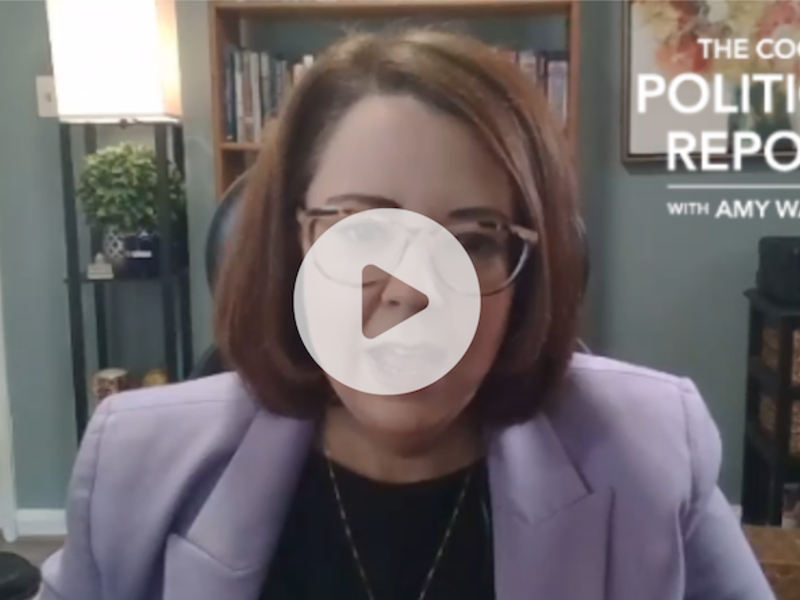
Midterm elections are a referendum on the sitting president. But, what happens when you have a former president getting in on the election action too? Last week we got our first glimpse of the split-screen midterm. On Friday and Saturday, President Obama was in downstate Illinois and southern California attacking the current Administration as "not normal" and "dangerous," and imploring Democrats to put away their cynicism and "ironic detachment" and pick up a clipboard to volunteer and organize voters. At the same time, President Trump was stumping for GOP candidates in North and South Dakota, mocking Obama’s speech as boring and arguing that the former president's presence on the trail is a gift to the GOP. "If that doesn't get you out to vote for the midterms," Trump said, "nothing will."
NRCC Chair Steve Stivers echoed this sentiment at a Christian Science Monitor briefing last Friday saying, "For three cycles President Obama fired up Republicans like nobody. And I’m happy he wants to do it again."
So, are Republicans right? Is having Obama on the trail more risk than reward? While he can fire up a Democratic crowd, especially younger and non-white voters, will he also, as one strategist put it to me, become "a frame-of-reference for the economic stagnation, liberal policies and higher spending Republicans will warn are in store if Democrats are handed the keys?"
My take: sometimes we make this more complicated than we need. While it’s true that Obama was a focal point of GOP anger and angst for the last eight years, he is no longer the most important act in politics. No one can or will overshadow Donald Trump. And, Donald Trump is going to make sure that’s the case.
The best thing that could happen for Republicans is not for Obama to become more vocal and active; it’s for Trump to become less vocal and less active. Ask any Republican in a tough campaign what they'd like most from Trump; it'd be to put down his phone, stop threatening to fire Jeff Sessions, and don't say nice things about Putin. In just the last few weeks, he's done all three.
This isn’t the first time we’ve seen dueling presidents on the campaign trail in a midterm election. Back in 2002, President Clinton took his first post-presidential foray onto the campaign trail. And, it didn’t go so great. Republicans picked up eight seats in the House that year and control of the Senate. Of Clinton’s impact on that election, the New York Times’ Adam Nagourney wrote: "Mr. Clinton did campaign on behalf of a number of Democratic candidates who lost, and some Democrats have suggested that Mr. Clinton's high profile might have unwittingly hurt by leading to a higher turnout among Republicans."
But, here’s the most important thing to remember about both men in 2002. President Bush had an approval rating of 68 percent, former president Clinton’s favorable rating (according to Gallup) was just 47 percent.
In other words, Bush was very popular. Clinton was not.
This year, of course, the reverse is true. Gallup pegs Trump current job approval at 41 percent, while Obama’s retrospective job approval is at 63 percent. Republicans haven't embraced Obama. They still don’t like him. But, he’s a heck of a lot more popular today than he was back in 2010 or 2014 (when he was in the mid-40’s).
But, the more salient question for Democrats isn’t will Obama serve as a foil for Republicans, but will he do a better job at motivating his coalition of voters to show up in this midterm election than he did in midterm elections during his presidency? Since 2009, Democrats have been unable to replicate Obama’s success with younger and non-white voters. This year, Democrats are worried about continued apathy among younger and non-white voters. While these voters are the most disapproving of Trump, they are also less interested and engaged in the upcoming election than white, suburban women who are fired up and ready to hit the polls.
Like Obama, President Trump cobbled together a unique coalition of voters that were loyal to him, not the GOP. They were the 'deplorables' and the small town voters in ‘fly-over’ country who felt dismissed and disparaged by the traditional political class. These voters, however, are also the most dismissive and distrustful of Washington. Why should they reward the very people in Congress that Trump is there to "put in their place?" The answer, says Trump, is pretty simple: if you don’t vote for Republicans this fall, the Democrats will impeach me. The message isn’t about rewarding Republicans, it is about protecting him.
That message may work in deep red states, but the "all me all the time" messaging is exactly what makes him radioactive in the swing, suburban seats that Republicans need to hold in the House. The more Trump keeps the focus on himself, it means less oxygen and space for issues that are important to these voters; the economy, the Supreme Court and de-regulation. This is especially true during these last few weeks when the spotlight has been on everything that's gone/is going wrong with the Trump White House (the New York Times op-ed; the Bob Woodward book; the Manafort/Cohen drama), and very little on what's going right.
For the last eight years, Republicans have had effective foils in Obama and Hillary Clinton. This year, however, their biggest impediment to keeping control of the Congress is their own party leader. There’s only so much traction that Obama-bashing will get Republicans if Trump remains as unpopular and polarizing as he is right now.










Subscribe Today
Our subscribers have first access to individual race pages for each House, Senate and Governors race, which will include race ratings (each race is rated on a seven-point scale) and a narrative analysis pertaining to that race.